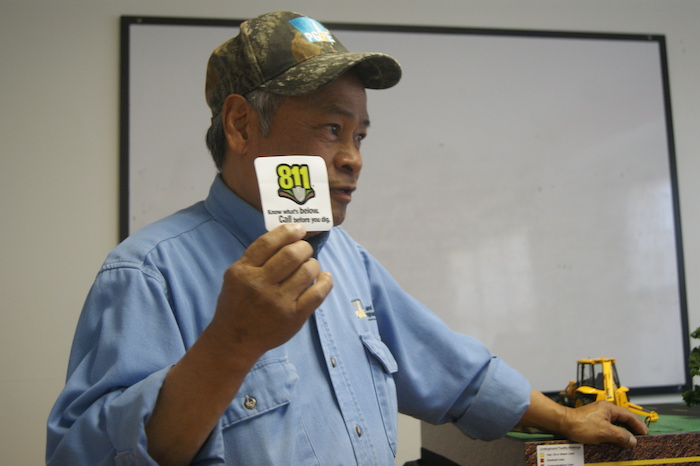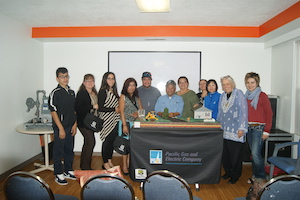
12 Apr Use the Phone Before the Hole

By Fernando A. Torres
You may be surprised to know what may be buried under your house. And you don’t want to find it out by yourself when digging to install a new mailbox or planting that lemon tree.
Breaking a pipe while digging could be disastrous and that’s why before any shovel activity, 811 is the number to call. A crew will come to find out if something is on the way. This service, including the call is free and it will take max two days.
And if you think that only gas pipes are buried under your house, you are wrong. According to veteran PG&E journeyman Rudolfo ‘Rudy’ Herras, a lineup of pipes could be buried under anybody’s feet. There are also pipes and wires that carry electricity, water, sewer, and telephone lines. If you are near a railroad station you may have a line with petroleum, or if you are “near an airport you may have jet fuel lines … Not only gas pipes are under there. That is precisely why you have to call 811 before you dig, so you know what’s below.” said Herras who is now a retiree.
Herras was speaking about the 811 number to an audience of Latinos residents of the city of Richmond. Initiated in 1975, the 811 is managed by the Underground Service Alert, a national non-profit organization that facilitates communication between excavator of all sizes and utility companies.
Herras said that PG&E has transmission lines from Bakersfield all the way to Eureka; a 6,700 miles of “big pipes.” Some of them are 42 inch pipe. Pressure could be from 60 pounds to 900 lbs or sometimes to 11 hundred lbs. If someone is planning any kind of dig; planting a tree, installing posts for a deck or a fence; a free phone call is in order to prevent personal injuries, outages, property damages, and fines and repair costs.
With this information “now I have a tool for my security, for the people who work for me and for my community,” said Luis Alvarez after the workshop. When working “I have to be more careful, specially when digging” said Alvarez who is a gardener.
The workshop was presented by PG&E, the Ethnic Media Services and the Latina Center, a popular Richmond community center for Latina women. With this 811 workshop “I learned something very important that if you hit a pipe and the gases go out, it is very harmful for the community, but also very expensive for your pocket,” says Gloria Alvarez, who is the director of the center’s program Women, Health and Leadership.
With a model resembling a house and street, Herras showed most risks when digging without calling 811. He distributed a card that when scratched-off an odor resembling gas comes out. Other cards showed the color used by the company to ID pipes; Red is for electric power lines, blue for potable water, green for sewer and storm drain, yellow for gas, oil steam, and chemical and purple for irrigation.
A group of women leaders of the Latina Center also attended the workshop. “I must not dig before calling 811. I didn’t know this and I did some excavations in my house. But I won’t do it again. If you are going to do an excavation please call 811 because you will save many of us,” says Maria Marquez, who is one of the participants in the program Women, Health and Leadership.
This workshop is part of PG&E grassroots outreach to inform day laborers and farm workers about the hazards of underground pipes and the need to call 811 before any digging. If you suspect a gas leak, do not use any ignition or sparking device.
The domestic gas smells like a rotten egg. This sulfurous smell is added on purpose so it can be easily identify. If you see dust flying in the air, dead vegetation, bubbles in a puddle or if you hear a whistle or blowing near a valve or gas meter, “You should leave the area immediately… can you dig it,” asked Herras.







No Comments